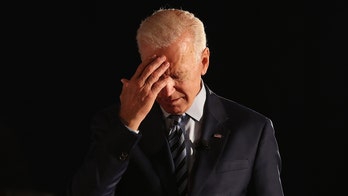
In a reflection of how colossal Uncle Sam's credit card balance has become, two top budget offices on Tuesday gave long-term deficit projections that were $2 trillion apart.
The discrepancy underscored how difficult it is to peg the path of the U.S. economy. But with a $2 trillion margin-of-error, it also showed how unwieldy the figures have become.
The Congressional Budget Office predicted deficits over the next decade will add up to $7.1 trillion, nearly $3 trillion more than previously projected. The White House Office of Management and Budget earlier increased its 10-year-budget projection to more than $9 trillion, an increase of about $2 trillion.
However, the CBO offers budget projections using a different standard, and an apples-to-apples comparison would show that the White House numbers were actually more optimistic than the Congressional Budget Office's.
The White House blamed its gloomy forecast on the economic crisis and the practices of the previous administration.
But both offices warned that with higher deficits leading to higher national debt, in turn increasing the federal government's interest payments on that debt, the economy is in serious trouble.
"Whatever their cause, the administration is very concerned about these out-year deficits, and getting those deficits under control is a top priority of the administration," budget director Peter Orszag said.
The mid-year reviews from the Office of Management and Budget and CBO were packed with grim economic forecasts.
The White House report showed the public debt doubling by 2019 and reaching three-quarters the size of the entire national economy. And Obama economic adviser Christina Romer predicted unemployment could reach 10 percent this year and begin a slow decline next year.
In a glimmer of better-than-expected news, the report projected the 2009 deficit will be $1.58 trillion, which is $262 billion less than officials predicted earlier in the year. The CBO offered a similar estimate.
The Obama administration said the 2009 figure was reduced in large part because it is providing less aid than expected to Wall Street.
But this year's projected deficit is still three times more than last year's deficit.
The CBO's long-term projection was smaller because it estimated the federal government would spend far less over the next decade.
James Horney, director of federal fiscal policy at the Center on Budget and Policy Priorities, said a big factor in the difference between the estimates is that the CBO forecasts based on current law and policy while the White House forecasts on the assumption that its budget proposals will pass.
That means the OMB numbers factor in additional budgetary spending, in addition to more tax relief, leading to bigger deficits. But an apples-to-apples comparison would put the White House 10-year figure at $6.3 trillion, less than the CBO's estimate.
"No projections are reliable," said Horney, who used to work on budget estimates for the CBO. "The first thing you learn is you can never get them right. It's hard to do. ... There's always a lot of uncertainty."
The CBO report said, in the long-term, "the budget remains on an unsustainable path."
The report warned that rising health care costs and entitlement programs will continue to put the squeeze on the federal budget, and that continued large deficits will contribute to a larger national debt, which could in turn hamper overall economic growth.
The national debt is $11.7 trillion.
Taken together, the CBO said the long-term picture poses a "threat to the economy."
Though the Obama administration was at the forefront of a $787 billion economic stimulus package and is pushing passage of a costly health care reform package, the administration said in a summary that the "failure" of past administrations to follow pay-as-you-go rules is causing much of the fiscal mess.
The summary claimed $5 trillion of the long-term deficit is attributable to the Bush administration's "failure" to follow that standard.
The rest of the deficits is due in large part to the recession, the administration said, since revenue is going down while spending on programs like unemployment and food stamps goes up.
Minutes before the OMB released its report, President Obama announced that he was tapping Ben Bernanke for a second term as chairman of the Federal Reserve.
But the decision was not enough to sidetrack Republicans from pouncing on the administration for the OMB report. They seized on the news, which could become a critical part of their arsenal in their attempts to rein in Democrats' proposals for health care reform.
"The alarm bells on our nation's fiscal condition have now become a siren," Senate Minority Leader Mitch McConnell, R-Ky., said. "If anyone had any doubts that this burden on future generations is unsustainable, they're gone -- spending, borrowing and debt are out of control."
While Obama blamed the Bush administration for trillions of dollars worth of red ink, House GOP Leader John Boehner said Obama hasn't done anything to reverse the high rate of spending.
"Instead of putting the brakes on Washington's spending habits as they promised they'd do, Democrats have stepped on the accelerator and spent taxpayer dollars with reckless abandon all year," he said.
Boehner said their health care reform plan would only compound the nation's budget problems.
The revised estimates project that the economy will contract by 2.8 percent this year, more than twice what the White House predicted earlier this year.
But the OMB report projects the recession will end in the second half of 2009.
Romer projected that the economy would expand in 2010, though by 2 percent instead of the 3.2 percent growth the White House predicted in May. By 2011, Romer estimated, the economy would be humming at 3.6 percent growth.
Both Romer and Orszag said this year's contraction would have been far worse without money from the $787 billion economic stimulus package that Obama pushed through Congress as one of his first major acts as president.
The Associated Press contributed to this report.




